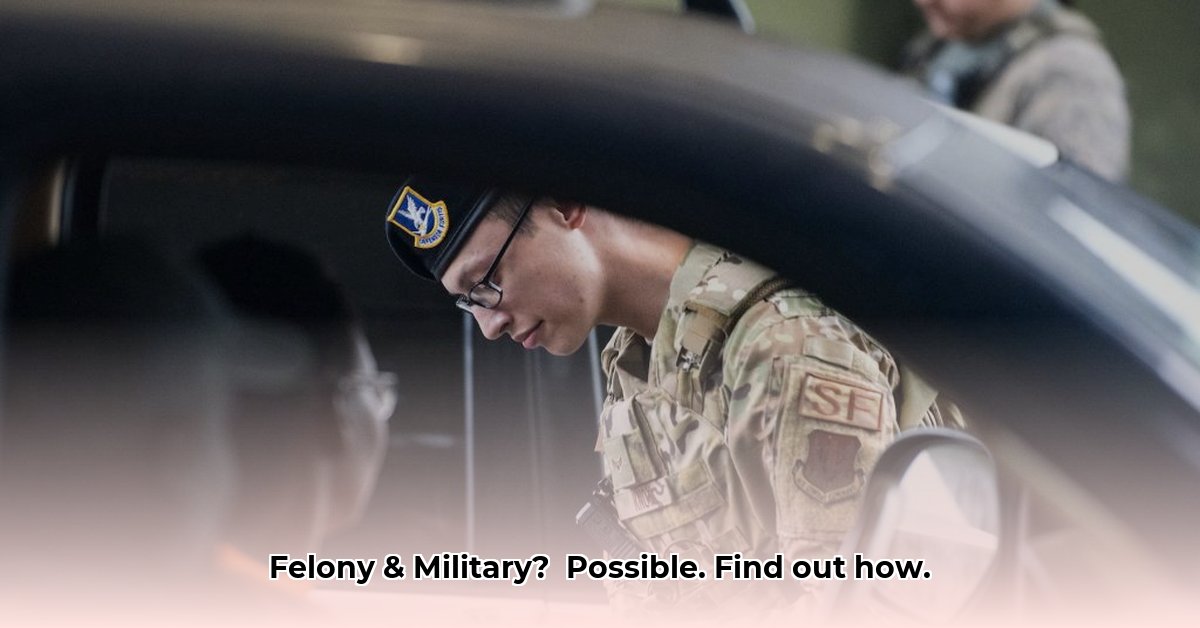Joining the military with a felony conviction is challenging but possible. This guide provides a comprehensive overview of eligibility requirements, the waiver process, and branch-specific policies. It’s crucial to remember that this information is for general knowledge and does not constitute legal advice. Consulting with a qualified legal professional is highly recommended.
Understanding Eligibility
Several factors influence your eligibility for a waiver:
Nature and Severity of the Offense
The nature of your felony significantly impacts your chances. Non-violent offenses like drug possession are more likely to receive consideration than violent crimes. The specifics of each case, such as the presence of a weapon or harm to others, are carefully scrutinized.
Time Since Conviction
Time is a key factor. A longer period of law-abiding behavior since your conviction suggests rehabilitation and reduces perceived risk. Recent offenses, even less serious ones, might pose greater challenges.
Rehabilitation Efforts
Demonstrating rehabilitation is crucial. Evidence of positive change like steady employment, community involvement, counseling, or substance abuse treatment strengthens your application. This shows a commitment to personal growth and responsible behavior.
Military Branch Policies
Each branch (Army, Navy, Air Force, Marines, Coast Guard) has its own policies and requirements, influencing waiver approval rates. Some branches may be more lenient depending on their recruitment needs and the applicant’s qualifications. Ongoing research into recruitment patterns suggests these policies can evolve, so checking current guidelines is essential.
The Waiver Process: A Step-by-Step Guide
-
Consult with Legal Counsel: A lawyer specializing in military law can significantly improve your chances. They can provide expert advice, help gather documentation, and navigate the legal complexities.
-
Contact a Recruiter: Discuss your situation honestly with a recruiter from your chosen branch. They can offer guidance on specific requirements and procedures.
-
Gather Documentation: Compile all relevant documents: court records, police reports, character references, and proof of rehabilitation (therapy records, employment history, community service).
-
Complete and Submit the Application: Work closely with your recruiter to ensure a thorough and accurate application, highlighting your rehabilitation efforts and commitment to service.
-
Await the Decision: The review process timeframe varies. Patience is essential as background checks and evaluations are conducted.
Military Branch Policies
Waiver policies are subject to change based on recruitment needs and force readiness. While some branches might be perceived as more or less lenient, individual circumstances play a major role.
| Branch | Felony Waiver Policies |
|---|---|
| Army | Generally more open to considering waivers, especially for non-violent felonies. Their needs fluctuate, impacting their leniency. |
| Navy | Stringent policies due to the sensitive nature of their missions. Waivers are possible but less frequent. |
| Air Force | Highly selective, often prioritizing individuals with spotless records. Securing a waiver is challenging but not impossible. |
| Marines | Similar to the Army in some respects, their approach to waivers can shift based on recruitment goals. |
| Coast Guard | Like the Navy, their focus on security and maritime law enforcement leads to stricter policies regarding felony waivers. |
Legal Assistance & Alternative Career Paths
Legal Assistance: Securing legal counsel specialized in military law is highly recommended. A lawyer can advise on eligibility, navigate the complexities of the waiver process, and represent your interests.
Alternative Career Paths: If a waiver isn’t granted, consider alternative forms of service: civilian government jobs, non-profit organizations supporting veterans, or community involvement.
FAQs
- Q: What if my felony has been expunged or sealed? While expungement or sealing might reduce the impact, full disclosure is crucial. Non-disclosure can lead to disqualification and potential legal issues.
- Q: Do juvenile records affect eligibility? Yes, juvenile records are reviewed. The severity of the offense and time elapsed influence their impact.
- Q: How can I improve my chances of waiver approval? Demonstrating consistent positive behavior since the offense is key. This includes stable employment, education, community involvement, and, if applicable, successful completion of rehabilitation programs. Strong character references can also support your application.
- Q: What are the potential consequences of not disclosing a felony conviction? Failure to disclose can result in disqualification, even after enlistment. In some cases, it could lead to legal repercussions.
Resources
- Official Army Website
- Official Navy Website
- Official Air Force Website
- Official Marines Website
- Official Coast Guard Website
Disclaimer
This article provides general information and does not offer legal advice. Consult with a qualified attorney for guidance on your specific situation.
- Top Rated Meditation Books to Deepen Your Practice - February 5, 2026
- Good Mindfulness Books For A Calmer, Happier Everyday Life - February 4, 2026
- Recommended Meditation Books for Beginners and Experienced Practitioners - February 3, 2026
















